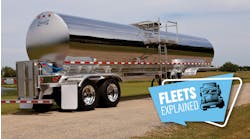With most economic indicators pointing to continued strong growth in North America, I believe the trucking industry can look forward to another year of healthy financial results.
That’s not to say that all trucking sectors are going to prosper during 2015. Length of haul is likely to continue its years-long shrinkage, as rail intermodal continues to make inroads into that market, meaning national truckload carriers are likely to continue to feel the pinch.
But Americans’ thirst for instant gratification when they click the “buy it now” buttons on their internet browsers are likely to continue to drive demand for regional freight shipments and direct-to-consumer moves.
Many industry executives are no doubt licking their chops over the last federal election results, confident that the government’s regulatory agencies are unlikely to be pressing for new initiatives now that Republicans control both houses of Congress.
But I think that 12 months from now, we’ll be looking at another significant increase in the number of truck-related highway deaths – which have now risen four years in a row – and I can’t help but wonder if there won’t eventually be a backlash on Capitol Hill.
A few notable fatigue-related truck crashes during 2015 could quickly unravel congressional support for the string of regulatory rollbacks that trucking’s lobbyists have been able to pull off in recent years, such as the recent killing of the Federal Motor Carrier Safety Administration’s HOS restart changes.
There are definitely times when you need to be careful what you wish for, and trucking’s ongoing resistance to safety improvements could well backfire if there is a spate of headline-grabbing crashes during the coming year.
I expect that continuing low petroleum prices will hamper the movement to switch a significant portion of the fleet to natural gas and other alternative fuels, since there appears to be no support to view the low prices as a temporary market switch and an opportunity to invest in long-term solutions by adding fees to diesel and gasoline prices to support research and development of new engines.
And as a final prediction, I believe that 2015 will be the year that an industry trade association is discovered to have spied on its employees by recording some internal telephone calls, transcribing the calls and storing the transcripts in the association’s computers.
While some U.S. courts have been grappling with the legality of employer snooping on employees and no final verdict has been reached, the discovery will at the very least be a morale-busting episode that will greatly increase internal dissension at this association.
Check this space in a year, and help me judge the accuracy of my predictions.


